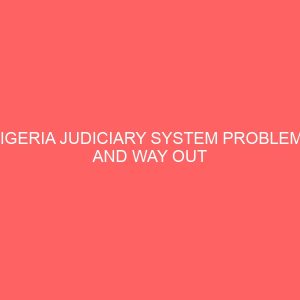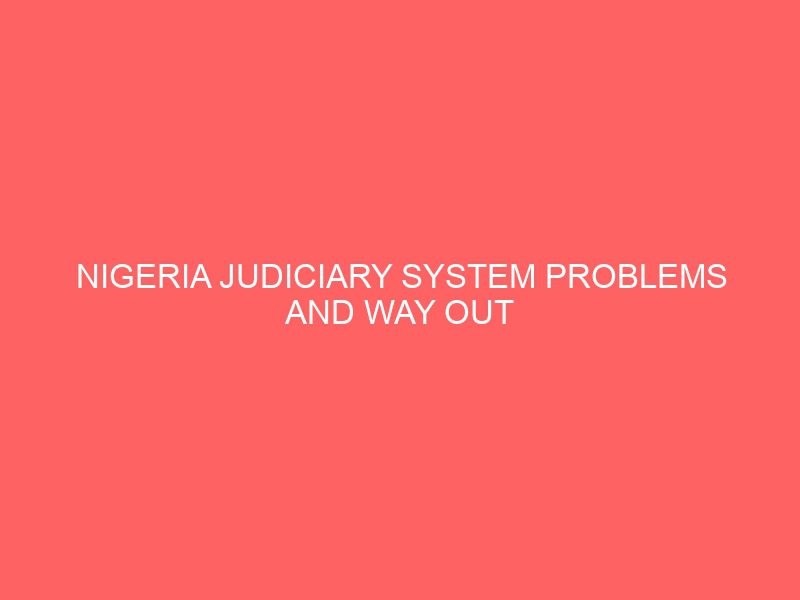Description
CHAPTER ONE
1.0 Introduction
The Judiciary represents the court system in the land, it symbolizes judges and justice. It is the third arm of any modern government. This was popularized by Montesquieu, the French political philosopher and jurist who postulated that there should be separation of judicial duties from legislative and executive functions to forestall tyranny.
A court system implies a judicial arrangement of graduated competences of hierarchal structural arrangement from lower to superior courts, courts of first instance to Supreme Court, where appeals are taken or heard, and special courts or tribunals, exists in modern democratic countries.
Lastly, for the administration of justice to be fair and equitable in any political setting, it should combine autonomy with accessibility and a certain degree of uniformity. To be fair means that it is objective and fearless. To be equitable implies that court rules are equally applied, as rewards and punishment to both the poor and the rich. Autonomy connotes independence and authority.
1.1Background to the Study
The Judiciary arm of government is responsible for interpreting the law of the land, while applying it in situations where they are necessary; this makes the job of the Judiciary a very critical one. The law of the land constitutes the bases upon which judgments are ruled; it is therefore fundamental that its interpretation and application be carried out with absolute alacrity and meticulousness Chambers, 2005. The Nigerian Judicial System comprises of the Body of Benchers and the Bar itself. The Body of Benchers is a collection of the highest ranking legal practitioners in the country which is headed by the Chief Justice of the Federation. It also has as its members the respective Chief Judges of the States of the Federation and certain very reputable lawyers in the country, whereas the Bar is a body of all the barristers in the country. These together constitute the Nigerian Legal Class. The Nigerian Judicial System has come a long way, taking its origin from the colonial era. It was saddled with the responsibility of checking the activities of the Executive and Legislative arms of government. The Judiciary as a matter of fact, plays a very vital role in the development of the country considering the fact it is the mechanism that oversees to the usage and management of power in the country. If the power that is vested on the Executive and Legislative offices is not checked, the bulk of the citizenry will have lots of troubles and challenges to contend with AkpuruAja, 1999.
The primary responsibility of the Judiciary is to ensure that the Executive and Legislative arms of government function within the ambits of the constitutional provisions made available to them. The Judiciary ought to stand isolated while performing its constitutional duty. It does not need any interference from the Executive or Legislature in carrying out its primary assignment. It operates independent of any external disturbances and functions with the constitutional power vested in its office. The Nigerian Judicial System has had lots of challenges to contend with. During the shambolic military era, the Judiciary was subjected to abject emasculation to the extent that it lost the substance to its name and only existed as a nomenclatural entity. To say the least, the Judiciary sank into oblivion. But with the advent of democracy came an organized political faade that accorded the Judiciary its rightful place as the watchdog of the polity. The importance of the Judiciary in any political system cannot be overemphasized, hence the constitution provides for its absolute independence to enable it perform its sacred constitutional function without sentiments and reservations AkpuruAja, 1999.
Personnel problems constitute by far the most daunting challenge facing the judiciary and is the single most important problem threatening the sanctity of the judiciary as the bastion of justice. The judiciary comprise of judicial officers who are human beings and therefore subject to the vagaries of human nature in its insidious form. While there are good, intellectually sound and upright judicial officers of impeccable character and integrity in Nigeria, it is sad to say that a sizeable percentage of judicial officers in Nigeria fall below the standard expected of judicial officers in the area of intellectual capability, uprightness, character and integrity and this reflects in the poor quality of judgments delivered by the various courts in Nigeria and the growing problem of conflicting judgments and the attendant confusion it brings in the legal system in Nigeria
The judicial system in Nigeria is beset with several deficiencies in its procedural set up that make it very difficult to obtain justice and quick resolution of disputes in courts. Most of the procedural rules of the various courts in Nigeria are in dire need of reform and review to make it accord with the need to discard technicalities and uphold substantive justice. A situation where many cases in Nigerian courts take years to be resolved does not bode well for the judicial system and encourages resort to selfhelp by disgruntled litigants.
1.2 Statement of Problem
There is no doubt that the Nigerian judiciary is plagued by a myriad of problems ranging from institutional to personnel problems, poor facilities to inadequate financial provisions and procedural to constitutional problems. Previous researchers that has sought need for solution to the problems suggested that there is the urgent need for constant training and retraining of judicial officers in the form of workshops, seminars and symposiums for judges to update their knowledge and restructuring the appointment process of judicial officers to ensure that only persons of acceptable intellectual capability, character and integrity are appointed to the bench. However, the researcher is examining the Nigerian judicial system with and view of identifying the problems within and recommending the way out
1.3 Objectives of Study
The following are the objectives of this study:
1. To examine the problems in the Nigerian judicial system.
2. To identify the way out of problems in the Nigerian judicial system.
3. To determine the factors encouraging problems in the Nigerian judicial system.
1.4 Research Questions
The following research questions shall guide the study;
1. What are the problems in the Nigerian judicial system
2. What is the way out of problems in the Nigerian judicial system
3. What are the factors encouraging problems in the Nigerian judicial system
1.5 Research hypotheses
The following hypotheses will be tested in the study;
Ho:The Nigerian judiciary system is not delivering justice to the people.
Hi:The Nigerian judiciary system is not delivering justice to the people.
Ho:The corruption into the Nigeria judiciary system has no way out
Hi;The corruption into the Nigeria judiciary system has a way out as proposed
1.6 Significance of the Study
The following are the significance of this study:
1. The results of this study will educate the general public on the problem in the Nigerian judicial system with a view of finding a lasting solution to the problems.
2. This research will also serve as a resource base to other scholars and researchers interested in carrying out further research in this field subsequently, if applied will go to an extent to provide new explanation to the topic.
1.7 Scope and Limitations of the Study
This study will cover all the issues within the Nigerian judicial system and also cover the approaches that can be used to solve the problem for better delivery.
1.8 Limitation of Study
1. Financial constraint Insufficient fund tends to impede the efficiency of the researcher in sourcing for the relevant materials, literature or information and in the process of data collection internet, questionnaire and interview.
2. Time constraint The researcher will simultaneously engage in this study with other academic work. This consequently will cut down on the time devoted for the research work.
1.9Definition of Concepts
Judiciary: The judiciary is concerned with the interpretation of law, administration of justice by giving concrete interpretation of laws made by the legislative arm.
System: It refers to an organized or complex whole and assemblage or combination of things or parts forming a complex or unitary whole.
CHAPTER TWO
LITERATURE REVIEW
2.1 Review of Empirical Literature
In a research of this nature, the importance of empirical literature cannot be underestimated. It evaluates the adequacy of the various research work done by scholars on the judiciary as a major unit of criminal justice system in Nigeria.
Research conducted by Obi Okoye 1988, gave a historical survey of judicial trials in Nigeria tracing its way back before 1914, when trials took place in haphazard courts, some traditional, some commercial or group interest courts and other statutory courts. The book epitomized one of the greatest contributions as it captured the development of judicial trials in Nigeria. The author critically examined the ambit of the courts and their subsequent jurisdictions. He equally acknowledged the noticeable strides in the judicial determination of disputes.
Yusuf 2006: 13, emphasized diverse issues such as the role of an independent judiciary in an emerging democracy, the rights of prisoners and detainees in Nigeria, EFCC and dispensation of justice, and the removal of judicial officers by the executive arm. The author argued that the main objectives of any criminal justice dispensation are the prevention and control of crime, the correction of offenders and by implication, the action and preservation of legitimate individual liberty rights and freedoms.








Reviews
There are no reviews yet.